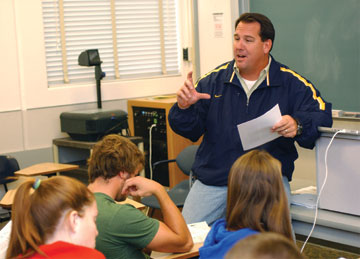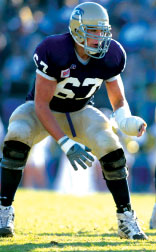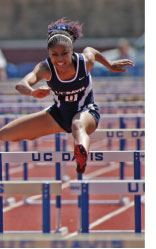Volume 24 · Number 2 · Winter 2007

Steve Doten, men’s water polo coach, teaches the freshman seminar “Sport in American Society.” (Jim Von Rummelhoff/UC Davis)
Sports
Class Act
At UC Davis, the coaches really are teachers, and the athletes really are students.
Coaches: at home on the field and in the classroom
It’s no secret that most coaches also consider themselves teachers, helping their athletes improve skills for the betterment of the team. But UC Davis coaches take that a step further by not only teaching while on the fields of competition but also by teaching off them, delivering hundreds of classes to the general student body. The philosophy of coaches as teachers has been a tenet of UC Davis for several decades and is so entrenched in the academic community that it was specifically mentioned as a core principle to be maintained during the university’s future life as an NCAA Division I institution. The philosophy will also help make UC Davis a rarity among Division I programs, whose coaches generally focus solely on their teams. At UC Davis, all full-time coaches—whether head coaches or assistants— also have teaching assignments that place them either behind a podium in a classroom or outside at a variety of venues, teaching everything from rock climbing to fly casting to badminton.
According to Sue Williams, program director of Physical Education, the coaches are helping fulfill an important part of the university’s overall academic goal.
“The campus asks coaches to contribute to the mission of the campus by being teachers in courses offered for units as well as in a competitive sport experience,” she said.
And because the campus wants to provide a physical education program that’s well-rounded and offers activities that meet student interests, coaches are expected to broaden their expertise. “All coaches can teach conditioning-type classes, such as jogging, exercise walking and weight training. But the real popular classes here are the lifetime activities like rock climbing, table tennis, martial arts and archery,” said Williams. “Our faculty is really good-natured and conscientious about training and learning new sports.”
For example, assistant head baseball coach Matt Vaughn learned rock climbing and taught three sections this past fall quarter. The new women’s volleyball coach, Steve Walker, is learning the basics of fly casting from men’s head track coach Jon Vochatzer to help meet a growing interest in the activity.
Coaches are teaching in the classroom as well. Men’s water polo coach Steve Doten teaches a popular class titled “Sport in American Society.” Other coaches teach freshman seminars and similar courses that help support a student’s academic goals. And they are evaluated by an academic review for their effectiveness in teaching.
With all of their team responsibilities, it would seem coaches might not be enthusiastic about teaching, but Williams, who was a highly successful cross country coach for nearly 30 years at UC Davis, said it’s a duty embraced by the coaches.
“The coaches we have find that an attractive aspect of the job,” she said.
Tenth-year women’s basketball head coach Sandy Simpson said teaching allows him to stay connected with the general student body.
“The plus side is your interaction with the students who are not student-athletes, and that’s a blast,” he said.
Head women’s water polo coach Jamey Wright, who teaches a freshman seminar on “Sports and Law in America,” agrees.
“It keeps your perspective fresh about what students at UC Davis are thinking and feeling and talking about beyond just athletics,” he said. “I think it’s an awesome opportunity for coaches to put their fingers on the pulse of the student body.”
Athletes: Chasing the right dream
For many young and talented football players, the dream is quite simple: be recruited to play for a major college, get noticed by professional scouts along the way, end up as an NFL draft pick and then enjoy all the fruits of a career many aspire to but few attain.

Elliot Vallejo (Wayne Tilcock/Davis Enterprise)
For senior Elliot Vallejo, a 6-foot-7, 315-pound offensive tackle at UC Davis, that was the dream painted for him as a highly recruited player at Palma High School in Salinas. There was only one problem.
“I don’t know if that was my dream or everyone else’s dream,” he said.
Turns out Vallejo really preferred following the footsteps of his father, Louis, who is an engineer, and he knew college was a means to that end. He had his priorities ready for the recruiters.
“It was mostly academics for me at the time,” he said. “I definitely wanted to go to a school with an engineering program. Next, it had to be a good school. And then, is the football team good and can I be happy here?”
Most of the schools in the Pac-10 Conference, as well as football powers such as Notre Dame, pursued Vallejo with vigor. He eventually settled on UCLA where big-time football and solid academics seemed to provide him with the perfect combination to follow his dreams.
But destined to be a starter on the Bruins squad, Vallejo found the time commitment and time constraints of a big-time football program incompatible with his academic goals, and he decided at the end of his first year to follow his dreams somewhere else.
One of his best friends was a UC Davis student and encouraged Vallejo to look north. And here Vallejo discovered what many athletes have found: that UC Davis can be a unique place to pursue their dreams both athletically and academically. Vallejo is now majoring in materials science and engineering at UC Davis while excelling on the football field where he is perhaps the Aggies’ top NFL prospect.
He said he is able to fully pursue his engineering dream, thanks to a coaching staff that allows him to miss practices and meetings for classes and to teammates who are just as engaged with academic pursuits as athletics.
And while the standout offensive lineman knows his life will eventually be filled with engineering, he hasn’t ruled out testing the waters of professional football.
“I really want to go to grad school, and I really want to play football,” he said. “Every two weeks I seem to switch.” But Vallejo believes that, whatever he chooses, UC Davis will have provided a firm foundation.
UC Davis has proved to be an equally good fit for sophomore track standout Sirena Williams, even though her eye-popping hurdling performance opened many doors for her.

Sirena Williams (Wayne Tilcock/Davis Enterprise)
As a senior at Edison High School in Fresno, Williams was enjoying a stellar prep career that landed her on the radar of UC Davis women’s track and field coach Deanne Vochatzer. The former U.S. Olympic women’s team head coach knew Williams’ talent would contribute to a solid foundation for the program as it moved to NCAA Division I. The interest was mutual. Williams knew that UC Davis offered a strong academic program that would help fulfill her childhood dream of being a veterinarian.
“I looked at the coaching staff and the school as a whole and on what I wanted to do later in life,” she said. “So, it kind of fit hand in hand because I knew I wanted to continue with track, but I also knew that my main focus was my academics.”
She remained firm in that resolve even when additional opportunities arose after she won the County-Metro Athletic Conference title in the 100-meter hurdles in a head-turning time of 14.17 seconds. It was a career-best time that was also the No. 3 all-time best time in Central Coast Section history. Several top college track and field programs began a late pursuit to sign her to their programs.
Despite their interest, Williams stayed committed to UC Davis because it offered her a chance to follow her heart. “I focused mainly on veterinary studies,” she said of the recruiting process. “That’s my goal, and it’s been my goal since I was 4 years old. I’ve always wanted to be a vet.”
For Vallejo and Williams, it’s those clear-sighted goals that have led them to UC Davis, paying dividends for both them and the Aggies.
